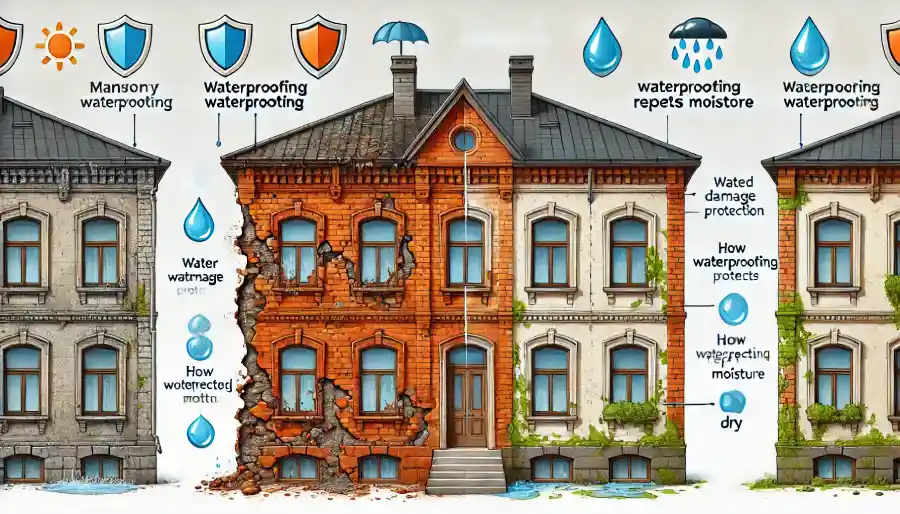Why Masonry Waterproofing is Essential for Long-Term Building Health
Key Takeaways:
- Masonry waterproofing is crucial for protecting buildings from water damage.
- Preventing water infiltration can extend the life of a building’s structure.
- Early implementation of these practices can save significant costs in the long run.
- Proper maintenance and treatment techniques are vital.
Understanding Masonry Waterproofing
Securing the durability and honesty of your structure starts with masonry waterproofing. This vital process involves the application of methods and materials to protect masonry walls, such as brick, stone, and concrete, from water penetration. By doing so, you safeguard the structural elements of your buildings from the adverse effects of moisture. Water can be an insidious enemy, entering through the most minor cracks and causing significant damage over time. Masonry waterproofing preserves the aesthetic appeal of your structures and maintains their strength over time. Waterproofing adds a layer of protection that guards against environmental factors, ensuring your building remains sturdy and beautiful for years.
The Risks of Water Infiltration
Water infiltration into masonry walls can have devastating effects. The primary concern is the freeze-thaw cycle, where water enters the masonry, freezes, and expands, causing cracks and deterioration. This problem is especially pronounced in climates with harsh winters and frequent and severe temperature fluctuations. Additionally, the consistent presence of water facilitates mold growth, which harms the building materials and poses significant health risks to the inhabitants.
Moreover, water intrusion can lead to the weakening of the mortar that holds masonry units together. This weakening reduces the structure’s overall strength and can result in partial or complete failure if addressed. In commercial buildings, this can disrupt business operations and pose serious safety risks to occupants. Residential properties are equally at risk, with homeowners facing potentially massive repair bills and compromised living conditions.
Benefits of Early Waterproofing
Implementing waterproofing measures early in construction or maintenance can mitigate these risks and save considerable repair costs. Early waterproofing helps prevent potential damage, a proactive approach far more economical than reactive repairs. By incorporating waterproofing measures during the initial stages of construction, you can address and prevent vulnerabilities that may otherwise compromise the structure over time.
It is valid for historic buildings, where masonry preservation is crucial for retaining cultural and historical value. These structures often have unique architectural features and materials that are not easily replaced or repaired. Early waterproofing helps preserve these elements, ensuring the building retains its historical significance and aesthetic beauty. Long-term maintenance plans should always include periodic waterproofing assessments and treatments to protect these irreplaceable structures.
Effective Masonry Waterproofing Techniques
Several techniques ensure effective masonry waterproofing:
- Sealants: A waterproof sealant creates a protective layer on the masonry surface, preventing water from infiltrating the material. Sealants are often applied to surfaces most exposed to weather conditions, providing an essential barrier against rain, snow, and ice.
- Membranes are impermeable layers applied over masonry surfaces to block water passage completely. Membranes can be particularly useful in foundation walls and below-grade areas where water pressure can be significant. They provide a continuous sheet of protection that ensures water does not penetrate the masonry.
- Crack Repair: Identifying and repairing any existing cracks in the masonry is essential to prevent water from creeping in. Crack repair involves cleaning out the cracks, filling them with an appropriate compound, and applying a protective coating to seal the repaired area. This step is crucial because even the most minor crack can allow water to enter and cause significant damage over time.
Materials Used in Masonry Waterproofing
The effectiveness of masonry waterproofing heavily depends on the materials used. Some commonly used materials include:
- Silicone-based Sealants: These sealants provide a flexible and durable waterproof barrier. Silicone sealants are a good option for outdoor use.
- Elastomeric Coatings: These coatings maintain integrity under various conditions because they are beneficial for surfaces prone to expansion and contraction. Elastomeric coatings can stretch and contract with the substrate without cracking, ensuring continuous protection against water intrusion.
- Bentonite Clay: Known for its quick water absorption properties, it is ideal for sealing areas rapidly exposed to water. Bentonite expands when in contact with water.
The Importance of Regular Inspections
Professional assessments can identify vulnerabilities in your waterproofing system before they become significant issues. During these inspections, experts look for signs of water damage, such as efflorescence (a white, powdery deposit on the surface of the masonry), cracks, and deteriorating mortar. They may also use specialized equipment to detect hidden moisture within the walls. By identifying these issues early, you can address them before they lead to extensive damage and costly repairs.
DIY vs. Professional Waterproofing
Professionals can access advanced materials and technologies not typically available to the average homeowner. They also provide warranties and guarantees, giving you peace of mind about the quality and durability of the work performed. DIY waterproofing projects can be complex and time-consuming, requiring a thorough understanding of building materials, tools, and techniques. Mistakes during a DIY project can lead to ineffective waterproofing and costly future repairs. In contrast, professional waterproofing services are performed by experienced technicians who understand the nuances of masonry waterproofing. They can accurately assess your property’s needs and apply the most effective solutions to ensure long-lasting protection.
Conclusion
Masonry waterproofing is a critical process that ensures buildings’ long-term health and stability. Regular inspections and professional services further enhance the efficacy of these efforts, making them indispensable elements of building maintenance and preservation.

